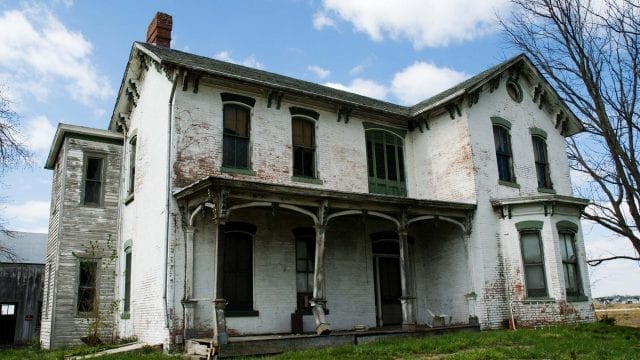
If you’re preparing to sell your house, just thinking about staging it for showing might make you feel tired. And so does thinking about fixing that ceiling leak. But is making your home pristine and appealing the only way to make a sale?
The short answer is no. If you know your home needs repairs or renovations before you sell it, investing money into these fixes isn’t the only way. There’s another option: selling it as-is.
What is an As-Is Sale?

Before you make the decision to sell as-is, it’s important to address some misconceptions about what it means to sell a home this way.
First of all, almost 100% of the time, a potential buyer will pay to have the home inspected by an unbiased third-party company. This inspection is likely to find existing issues with the place, even if you don’t disclose them beforehand.
In addition, most areas require you to answer honestly when asked about any issues the home has. These laws are designed to protect as-is buyers against deliberate deception. And in many states, when you sell as-is, you are required to disclose known issues about the place. These might include the following:
- Presence of mold
- Termite damage
- Roof leaks
- Structural issues
- Noise issues from the surrounding area
- Any legal issues pertaining to the title or ownership of the home
When a buyer signs the agreement to buy as-is, they legally must sign a document stating that they understand the existing issues the home comes with and that you, as the seller, will not be responsible for those repairs.
If you opt to sell as-is, it’s important to note that many states don’t require you to disclose issues with the home without being asked. If you are asked and you answer untruthfully, you may face legal action.
In some cases, if you hire a realtor to sell your home as-is, you may believe that this removes some of the hassle of selling. And while it may be true that some of the hassle is removed in this case, hiring a realtor opens up a new potential set of issues.
Due to the Consumer Protection Act, realtors are held to a higher standard than homeowners who sell homes themselves. If a realtor knows of anything that might dissuade a buyer from purchasing a house, he or she is obligated to disclose it.

For instance, if a realtor has seen mold in your house’s basement, this is something they need to disclose. And unlike homeowner-sellers who only need to disclose issues if specifically asked, a realtor must disclose issues whether the potential buyer asks or not.
Selling your house as-is carries the considerable advantage of not requiring you to perform home repairs. But what other downsides are there?
The Potential Downsides of Selling As-Is?
The main downside to selling your home this way is that you don’t have much negotiation power at all. You know that the house you’re selling has existing issues, and any potential buyers will likely think that you’re in search of a quick sale. Because of this, you’re very likely to run into buyers who low-ball to try to haggle the sale price as low as possible.
Another downside, although it might seem obvious, is the fact that you won’t be able to ask for as high of a selling price as you would if the home was in great condition. Of course, selling this way saves you money when it comes to repairs and renovations, but because that cost is effectively passed on to the buyer, your sale price will be significantly lower.
In many cases, buyers who are interested in a house being sold as-is will also be inherently distrustful. Because many people think that as-is sellers have something to hide, they may lower their offers because they assume the home has additional issues that aren’t there. Even if you are as up-front as possible, this may still be an issue you’ll run into.
And lastly, selling as-is often means you will have limited buyers from the start. While some people prefer a fixer-upper house, many more don’t want to sink the time or money into fixing up a home. For those seeking a mortgage, it may be very difficult to find one when buying a home in poor condition. This means that your buyer pool maybe even further limited.
How Can You Decide Whether to Renovate or Sell As-Is?

Selling your home as-is may sometimes be a viable option. But for most sellers, it’s wise to consider all selling options before making a choice.
If the seller’s market is especially good, it may be worth considering renovating if doing so will increase the home’s market value significantly and if you have a good choice of selling the home post-renovations.
Determining the worth of renovation will be up to you and the market if you do your research properly if you decide to renovate you can also consult this more comprehensive renovation guide from The Kay-Grant Group which can help save you additional overhead and increase your profit margin.
But if the market is even or bad, it’s unwise to invest more than 30% of the total value of the home into renovations. While investing more may bring you a profit, it’s unlikely to bring a significant profit unless the market is doing very well.
When making this decision, be sure to factor in the hassle and time-consuming nature of renovations, as well as the cost. And if the market trends downward during the time you’re making the renovations, you run the risk of taking on significant cost for little profit.
What’s the Bottom Line?
When you’re considering selling your home as-is, there’s no easy answer as to whether you should proceed with this route or make repairs and renovations before the sale. Market considerations are important, but the bottom line is this: if you don’t have the money to renovate (or if you don’t want to take on the credit debt to do so), selling your home as-is is likely your best option.
Remember to read and understand local laws on sales and necessary disclosures and to be completely honest with potential buyers, and chances are good that you will be able to sell your home quickly and with minimal hassle.








